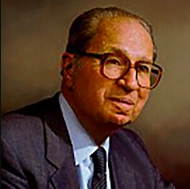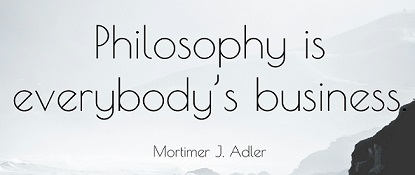|
Word Gems
exploring self-realization, sacred personhood, and full humanity
Soulmate, Myself:
Omega Point
|
Kairissi and Elenchus discuss how lovers' perceptions of existential beauty lead them to ultimate intimacy and oneness
|
PART I
return to 'Omega' contents page
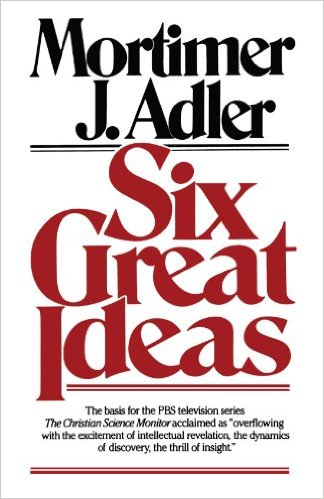
truth, goodness, beauty: ideas we judge by
freedom, equality, justice: ideas we act on |
|
Editor's prefatory comment:
The following discussion by Kairissi and Elenchus draws upon concepts from Dr. Adler’s Six Great Ideas. I count this book as one of the most important of my life.
READ MORE on the Six Great Ideas page.
|

Elenchus. I was reviewing Six Great Ideas recently and was impressed all over again with its blazing insights.
Kairissi. “Truth, goodness, and beauty: ideas we judge by."
E. And I hadn’t realized that beauty is a form of both truth and goodness.
K. “Beauty's in the eye of the beer-holder,” said our friend Skeet.
E. That’s a good one. But that book got me thinking about what happened to us when we first “met.”
K. Like “when Harry met Sally”?
E. No, not like that - but, you know, when we first realized who we are to each other. Adler’s opened a new vista of thought about that mystical experience.
K. Are you able to explain what happened to you now?
E. Actually, no; I mean, only a little. But the concepts of truth, goodness, and especially beauty, help to clarify my thinking. I see that the beauty of physical allure had nothing to do with my “great awakening.”
K. Why don’t we offer some excerpts from Six Great Ideas and see where they take us?
E. There’s so much in Adler’s book, but let’s begin with what he said about the ecstatic experience.
K. Allow me to point out that "ecstasy" literally means "standing outside".
Adler: "The pleasure of contemplation is the pleasure of spectatorship, a pleasure that lifts us up from our practical involvement in the purposeful or interested activities that occupy the greater part of our daily lives. It might also be said to lift us out of ourselves, resulting in a kind of ecstasy."
E. “Standing outside” comes to mind when I think of what happened to me. But, I didn’t leave my body. I mean, it wasn't like what the Ancient One did to Bruce Banner.
K. If it wasn’t like astral traveling, then why does “standing outside” resonate with you?
E. Right now, I can't explain it.
K. Well, let’s talk this out. As we’ve often said, “Let the answer come to you.”
Adler: "The enjoyment of beauty happens to us. We do not seek it out. We go to a baseball game, to a museum, or a concert, with the hope, perhaps, that the ecstatic moment will occur—the moment when, in one way or another, we exclaim our appreciation of the beautiful. But it does not always occur, and hoping that it will happen is not the same as seeking it out... Whether that good befalls us or not is beyond our control. It is ultimately a good of chance rather than a good of choice."
E. Some of what Adler says here applies to me, and some does not. He says that the “ecstatic moment” cannot be planned, “we don’t seek it out.” That was certainly true for me; in fact, at the time, I had negative feelings toward you, and casting you in the role of eternal romantic mate was the last thing on my mind.
K. Adler calls the perception of beauty a “good of chance.” But while the initial “opening of the eyes” cannot be put on a calendar, it’s not exactly a process of randomness, either.
E. We know that the Guides say that Twin Souls are created together, and so it’s their destiny to find each other. And therefore it's more of a “good of choice,” but not at the surface of personhood. At that level, it seems that you were not my choice, but you were the choice of my deepest self, the soul.
Adler: "The enjoyment of beauty is not confined to the lives of those who have the habit of visiting museums, attending concerts or ballets, going to the theater, or reading poetry. It occurs also in the lives of those who are baseball, basketball, or football fans, those who go to bullfights, those who watch tennis matches, and so on.
"The sports spectator who, beholding an extraordinary play or
action, cries out, 'Wow, that's beautiful,' is experiencing the
same enjoyment or disinterested pleasure that is experienced
by the auditor of an extraordinary performance of a Beethoven
quartet or by the person who, if it were not impolite, would be inclined to cry out, 'Wow, that's beautiful,' when witnessing an extraordinary twist of the fan by an actor in a Kabuki drama or an extraordinary pas de deux by ballet dancers."
K. Let's also define "disinterested." It means that the spectator is unbiased to the process, there’s no personal advantage, no selfish motive; for example, as a sports referee ought to be.
E. Earlier, Adler spoke of our mundane "interested" activities, meaning, the things we do to obtain a benefit.
K. And something related, we use the phrase vested "interests," meaning, there's something in it for you.
E. But our appreciation of beauty is different, in that, there's no practical advantage in play. It's a "disinterested" perk.
K. Now I hate to be compared to a baseball triple-play but, in your ecstatic moment, did you exclaim, “Wow, that’s beautiful!”
E. Well, this is where I really part ways with Adler’s examples. I know myself well enough, and the memory of what I felt that first time I “saw” you is so vivid, that I can say with some force that “Wow, that’s beautiful!” was far from my mind. That's not how it was at all.
K. But this was an ecstatic moment for you. Spectators of superlative beauty with baseball, or tennis, or the art gallery want to exclaim and cheer about what they see. They’re very exuberant and “standing outside” themselves in the thrill of the moment. Why was it different for you, Elenchus?
E. I think I’m getting close to understanding something new.
K. Our discussions help us clarify what we think we know.
E. A moment ago you made a comment that’s giving me pause. You said that other spectators of beauty were “standing outside themselves in the thrill of the moment”. I was “standing outside” myself, too, but not in thrill.
K. Explain this.
existential beauty
E. As we’ve seen from Adler, the “pleasure of contemplation is the pleasure of spectatorship, a pleasure that lifts us up from our” mundane lives. But he goes on to say that this “lifting up” or “standing outside” can occur in another context. Theologians, Adler reminds us, speak of the “rest of God”. This is not the rest “identified with sleeping or relaxing” but finding oneself suffused with a sense of existential beauty and “spiritual pleasure," or maybe an inner quietude of burgeoning well-being.
Adler: “Where can we find” this kind of “rest on earth,” he asks, “a rest that is remotely comparable [according to religious tradition] to the heavenly rest of the souls who enjoy in heaven the beatific vision of God?”
the intense inner quietude of burgeoning well-being
K. I’m starting to feel a little breathless. I think we're about to see something important. These are heavy concepts, Elenchus - and is this what you felt in your ecstatic moment, the “rest of God”?
E. I’d never thought of it in this way before, but now I have to say, yes, that is what I experienced.
K. But what does this really mean?
E. I’m trying to sort it out.
K. I think this is why you didn’t feel like gushing “Wow, that’s beautiful!”
E. Ok, I think you’re on to something there. My ecstatic experience wasn’t like a revved-up fan at a basketball game “standing outside” himself in the thrill of the moment.
Krishnamurti, 27.May.1965. There is a beauty which is not the result of a stimulant, and that beauty cannot exist without great simplicity. Simplicity is not a matter of possessions but comes about when there is the clarity of self-knowing.
K. Yours was a “standing outside” yourself in the divine rest of the moment. But this sounds foreign to us. And it’s all the more anomalous because that's when you realized who your eternal romantic mate is! So, why wouldn’t there be some thrill with that? – or some joy in the knowing?
for a long time we've said that 'joy' is the defining trait of authentic romance but the 'rest of God' sounds like something different
E. Let’s proceed slowly here. There’s a lot to analyze all at once. But, you’re right. For years we’ve been telling our readers, going way back to “Prometheus,” that John-and-Mary love is characterized by “comfort and thrill,” mere biological-psychological benefits designed to perpetuate the species but devoid of higher-level attractors.
K. But, in contrast, we’ve also said, many times, that joy is the salient attribute associated with Twin-Soul romance. I'd like to think that we still subscribe to that assessment, but, if so, why wasn’t your ecstatic experience laden with joy instead of “the rest of God”?
E. To solve this puzzle we’ll need a clear definition of “the rest of God” – because, right now, and I hate to say it but, “the rest of God” can sound like some empty platitude from worldly Big Religion.
K. And I believe you when you say that your experience of “the rest of God” was very moving and life-changing. It’s just that, I can’t imagine what could be more emotionally satisfying than romantic joy.
E. Ok, I understand, but may I encourage you to reserve judgment until all the facts are on the table?
K. (sighing)
E. Kriss, I’m understanding a little more of “the rest of God.”
K. (silence)
E. As I’ve explained on other occasions, when we "met" I began to choke up, it was hard for me to breathe, I couldn’t talk. And only now, after all this time, am I beginning to understand what was happening to me. In past times, when I’ve tried to explain what I was feeling I’d say something like, “It was like being immersed in total joy.” And yet, when I’d say those words I’d immediately feel that this was not really accurate. I don’t want to be misunderstood. What I was feeling was the most astonishing interplay of pleasurable perceptions of my entire life. It was like an internal total-field perception of well-being.
K. And yet, with all that, you feel that “joy” is not the right word to describe it all?
E. How shall I put this? – “love” and “joy” were part of the experience and mixed into the perception; but there was something else, even greater, that mesmerized and commanded attention.
K. Again, Elenchus, I accept what you’re saying, but all of our lives we’ve heard that love and joy are the greatest attributes. In fact, the Bible is famous for teaching that “God is love,” meaning, more than anything else, this is what God is.
E. That verse is true, as far as it goes, but I think it needs a little fine-tuning.
K. Tell me what you mean, Elenchus, as you’re the philosopher in the family, but, I have to tell you that right now, I think I’m more confused than I’ve ever been in my life.
E. In those moments of my ecstatic revelation – yes, of course, I loved you and there was joy – but, as I recall the feelings just now, I'm seeing that this was a love and joy beyond their ordinary meanings... what I was really feeling is that... I became you.
K. (silence)
E. There was no sense of separation. When I say this, I want to make clear that I was fully aware, on an intellectual level, that there was a “you” and a “me” – individuality was preserved; even so, I felt totally one with you. I guess, what I'm trying to say is, on a deeper level, the concept of "you and me" disappeared.
K. A long time ago, you told me that, during that special time, you experienced the most erotic feelings of your life. And we didn’t even touch hands.
E. The great mystic teachers and Spirit Guides inform us that our essential male or female essence centers in the soul, not the physical body. And in that experience, I subliminally sensed what this meant.
K. Elenchus, say more on “I became you”.
E. I'd like everyone to consider the following channeled testimony, especially the statement, "I became herself":
|
the extreme delight of being known and understood as thoroughly as one knows oneself
An excerpt from Andrew Jackson Davis’ “Death And The Afterlife: Eight Lectures On The Summer-Land”:
"In the Summer-Land this ‘language of the heart’ is carried to an inconceivable degree of perfection. For instance, suppose you and [a lost love] should meet — you who have not met for long, lonely years… two persons, meeting face to face, meet also heart to heart, and are forever friends. On Earth it is but the hands, or eyes, or lips that touch and speak. There, it is the indescribably sweet and perfect meeting of soul with soul.
"They thus inhale and thoroughly understand each other. For the first time there sweeps through the gladdened heart the eminent satisfaction of receiving perfect appreciation through the deathless wisdom of a brother, a sister, or a [romantic] companion. Your most secret history is wordlessly told and forever known; the details of your earth-life appreciated, and with all their innumerable bearings upon the shape of your character; and so, too, are comprehended all the steps that have brought you to that position in the upper existence…
"The delightfulness of this conjunction constitutes the beautiful, glorious happiness which diversifies, gladdens, and exalts the inhabitants of the Spheres.”
from Excursions to the Spirit World by Frederick C. Sculthorp:
“There were hundreds of people here [at the social gathering] whose faces I had never seen before, yet I could not see a 'stranger'. We all 'knew' one another. I cannot attempt to explain this."
"When two sincere friends meet on a pleasant plane, each will radiate a thought of pleasure which will be received by the other. Each recipient's pleasure is therefore doubled and the returning thought is consequently doubled. This multiplication of the original thought many times and at electrical speed gives some idea of the happiness on some planes."
"There is a complete absence of 'class', 'sets' or 'cliques'. There are no critical thoughts or lionizing some to the exclusion of others. There are no sects, dogmas, or denominations with their earthly trimmings that have led to so much division and bloodshed throughout history."
I became herself...
Archdeacon Wilberforce, Letters from the Other Side:
"On this side, when I met my beloved ... I became herself - she was transformed into me. All that she knew and felt became the content of my consciousness. All that I had attempted and achieved, all that I had failed to accomplish, yet battled and struggled to complete, was known to her as no words, no thoughts even, as earth uses the terms, could have conveyed. We were one, yet individually our own very separate selves, knowing as we were known, to the full extent of each other's capacity. Capacity is the only limitation in the spiritual realms."
Compare to the following, from Excursions to the Spirit World by Frederick C. Sculthorp:
“So I concentrated my thoughts on her and simply said: ‘Come!’ After a short pause my wife suddenly appeared in the lane walking towards me. I felt very happy at the success of my telepathic call… as she came closer, I noticed that her features were exactly as they had been on earth. Then, as our auras met, there was a transformation. [Her features] were perfection. She was my same companion, but different; yet I knew her better than I had ever done before. I would have recognized her unfailingly, even with my eyes closed, because her whole life and personality were contained within her aura and I could sense the years of her companionship with me. I was also aware that she knew me better than she ever did before. There seemed to be a wonderful harmony between us, for we both uttered the same words of greeting and blessing at the same instant. After that we did not trouble to speak with our lips -- speech was too slow… we were able to exchange thoughts with unbelievable rapidity.”
|
K. How did it feel when “I became you”?
E. In “The Wedding Song” we said that love is an awareness of a bond, a sharing of an underlying “one life” of Universal Consciousness. We might do this with all things, and all people, but there is one person with whom the sense of affinity is most potent and complete.
K. That would be your Twin Soul.
E. However, even with a Twin, when we apprehend this sense of shared life, even when we feel the strong affinity, there remains a lingering perception of one’s need for love or the threat of its loss. In other words, we might verbalize this subliminal feeling like this:
“Right now I feel the warmth of our love, our bond and shared life, and, for the most part, I feel satisfied and whole. But, even in the midst of this love and joy, there's a lingering hint of malaise, I still remember what it was like during those long lonely years without you; and even though at this moment I feel happy to have you near, the memory of the yearning for love does not leave me.”
K. But wouldn’t this be normal? Certainly, we wouldn’t lose our minds and thoughts of the past when we find true love.
E. What you say is correct, and yet what I say is accurate, too.
K. How can we understand this?
E. Let me try again. In “The Wedding Song” we spoke of “God as singular pervasive reality.” The ancient scripture “The Eternal is One” is better translated from the Hebrew, “The Eternal is All there is,” meaning, everything is an expression of God, and there is nothing else. In the quantum world they would say, “Consciousness, not matter, is the ground of all being. Everything derives from Consciousness. Nothing exists independently of it.”
K. Are you saying that during your ecstatic moment you accessed this sense of “God as singular pervasive reality”?
E. Moreso than at any other time. I think I briefly inhabited a level of consciousness which will one day be our natural home.
K. And when you "inhabited" that new awareness, were you alone or was I with you?
E. Strangely, the answer is neither. I had "become you," and there was no longer a "you" and no longer a "me."
K. (sighing) In that domain of “The Eternal is All there is”, do we not have memories of the past?
E. I know this is confusing in terms of how we normally look at the world, but this isn't about losing memories. God has perfect memory, perfect awareness, of all that’s going on in the universe – the good, the bad, and the ugly. She is aware of all the suffering, but it's not seen as "evil" in terms of an opposing separate entity.
K. Because "the Eternal is all there is."
E. The virtues of God have no polar opposite because, along with everything else, they're part of singular pervasive reality. There is nothing else. And the negative things, which many believe stand in defiance of God, in reality, have no substance, of and by themselves.
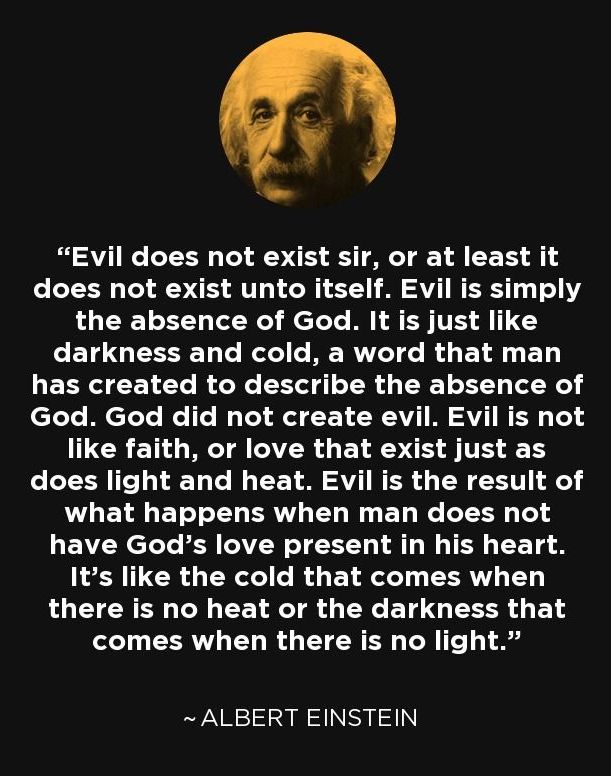
K. Elenchus, what does all this have to do with Twins "becoming each other"? How is it that you could meet me, your romantic Twin Soul, in that world of “God as singular pervasive reality”?
E. My perception of you in that realm where “God is all and in all” made me feel that there was no you and no me. There was not a particle of separation between us. We were completely one.
K. It seems that we’d arrived at, or made real, the mystical and sacred “One Person” spoken of in ancient literature.
E. And in that elevated sphere of oneness-existence, the “needy little ego” no longer had power over us. This means that, when I realized who you are to me, and knew that you were mine, the ego did not poison that perception with unspoken fears of “What if I lose you? What if you can’t love me as much? What if we’re not as happy as I’d hoped? What if…? What if…?” There wasn't a shadow of that imperfection, only total and complete oneness.
K. I’m now understanding why you called this vista of our love relationship “the rest of God.” It's a feeling of arriving at everything we've always wanted.
E. And in that arrival, the soul enters a complete rest. There's no longer a striving. And I’m seeing that “the rest of God” is a mode of existence in which we are no longer tormented by the ego’s fear of loss, fear of separation, and the chattering in the head.
K. These fears of the ego keep people apart. Krishnamurti talked about this in his lectures: it's the problem of seeing oneself, vis-a-vis others, as "subject and object."
E. At a most fundamental level, this is what divides us from God, creation, others, and even from one's Twin. When we view life in terms of "subject and object," there can never be real union but only a sense of "distance."
K. And for romantics this "subject and object" would be "lover and beloved." But -- how strange! -- even these terms of endearment can cloak a sense of separation!
E. Krissi, over the years we've talked about a feeling of "emptiness" if we were to contemplate being with a non-Twin. But right now I'm seeing that, strictly speaking, it's not so much "emptiness" as "distance"; it's the problem of "subject and object."
|
observer and observed, subject and object, lover and beloved
The following is reprinted from the Krishnamurti lecture of April 16, 1968:
"What is necessary is a mind that is untortured, a mind that is very clear... to observe, to look: to look at anything without the image of that thing, to look at a cloud without the previous associations with regard to that cloud, to see a flower without the image, the memories, the associations, concerning that flower.
Editor's note: This is a very important point concerning the "images" created by the ego, which protect it. But it occurs to me that these images come into play not just when we see something in the external world, but also when we "see", mentally, within. In our contemplations of persons and things we also create images which keep them subservient to the ego. We might say that this is the cause, right here, of all of the world's conflicts, as, no matter what we see or think of, it's mentally presented as filtered through "images" which, in some manner, protect the ego, and distort reality in the process. I"m reminded of incredibly insightful comments by mystic Omraam Mikhael Aivanhov, asserting that the great benefit of Twin-Soul love, even more than empyreal pleasures, issues, counter-intuitively, as "freedom from illusion." See more on the "Wedding Song" prologue page.
Krishnamurti: "Because these associations, these images and memories, create distance between the observer and the observed. And in that distance, the division between the seer and the thing seen, in that division the whole conflict of man exists...
"So one must learn the art of looking, not only at the clouds and the flowers, at the movement of a tree in the wind, but actually looking at ourselves as we are, not saying, 'It is ugly', 'It is beautiful, or 'Is that all?' - all the verbal assertions that one has with regard to oneself. When we can look at ourselves clearly, without the image, then perhaps we shall be able to discover what is true for ourselves. And that truth is not in the realm of thought but of direct perception, in which there is no separation between the observer and the observed. One of the fundamental questions is man's relationship to the ultimate, to the nameless, to what is beyond all words."
Editor's note: Notice the levels of relationship:
(1) man's relationship to "the ultimate"
(2) man's relationship to "the self"
(3) man's relationship to others
In all these, in each case, we tend to erect symbols, images, with which we interact and, in so doing, never approach the reality of the thing in itself. This "distance" between observer and observed, K says, is the root of world conflict.
See the articles on "images."
|
soulmate, myself
K. Oh, Elenchus, this is fabulous!
E. What?
K. I just saw something. Way back in “Prometheus,” in the prefatory comments, the author recounted an incident of many years prior, how he’d been jarred from sleep in the middle of the night, with the term “soulmate, myself” hot upon his spirit.
E. He said that he instantly knew this to be associated with a title to a future book, even though, at the time, he had no clue as to what the phrase "soulmate, myself" meant.
K. It’s the lack of “distance”! It’s the mystical “One Person”! In a sense, it's becoming one’s lover!
E. And this collapsing of "distance" would also lead to perceptions of the other descriptors that we love so much: the "coming home", the "you are just like me."
K. And "the utter familiarity."
E. In that late hour, the Guides were communicating an epicentral aspect of authentic eternal romantic love, all wrapped up in the poetic little term “soulmate, myself.”
K. It's amazing! - we might be given a mystical experience with special knowledge, like "soulmate, myself," but then it could take another 30 or 50 years before we're given the meaning!
E. This is a new insight.
K. And they're coming fast now. We can see that it wasn’t so much that you lost your memories during your vision of "oneness" but that all of the egoic concerns were, in effect, neutralized, just swallowed up, by an overwhelming sense of integration, wholeness, meaning, and completion.
|
he's fretting she might not come, praying she'll come, when summer is through
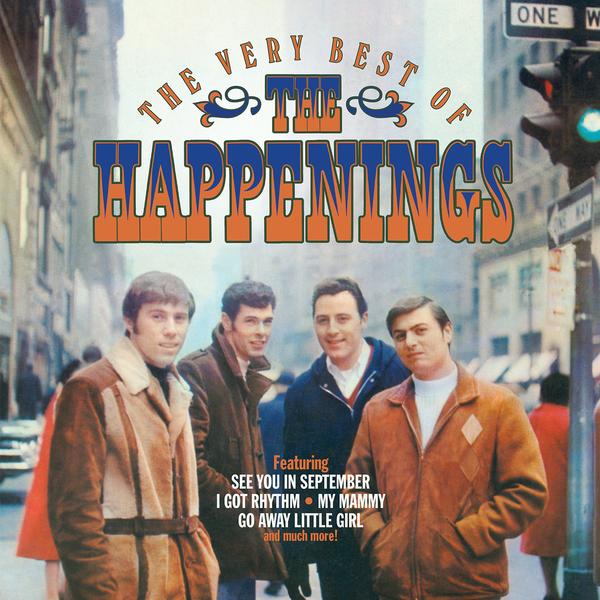
"When The Summer Is Through" (1966)
|
all summer long, I’ll be praying that you, will still feel the same, when the summer is through, come back, when the summer is over, I’ll wait for you, so impatiently, I’m longing to see you in September, the summer can’t go by, soon enough for me…
|
K. Elenchus, this song exemplifies the “what if” loss-scenarios of the ego. But I really like this old song.
E. I like it, too, but tell us what you see Krissi.
K. It’s a song about two college kids, madly in love, but separated for the summer. He probably has little to worry about, but this doesn’t stop him from imagining the worst.
E. It’s a great example of what might be true love, yet tainted by elements of “distance” and existential separation.
K. Elenchus… I have to admit… this song really hits me hard... It opens up a repressed wound... Back then we were too messed up to think about going to college together but… I have to say… this reminds me of what we lost… and it really hurts…
E. I understand… and all I can say right now is that we’re not the first in history who lost each other in this world, and I have to believe that God and the Guides have made provision for people like us to recapture hearts’ desires in Summerland.
|
|
'the Eternal is One, there is nothing else': the parable of the two whirlpools

Elenchus. Our statements concerning “the Eternal is One, there is nothing else” are not easy to understand.
Kairissi. Which is why quantum mechanics’ assertions are also non-intuitive; that, consciousness, not matter, is the ground of all being in the universe, and that everything derives from Universal Consciousness.
E. It’s not intuitive because pretty much everyone is a materialist at heart. It’s really hard not to be; I mean, trees and tables, people and pineapples, all seem very solid to us. And not just solid, but they definitely seem to be “out there,” separate from ourselves, so why shouldn't there be "distance"?
K. We’d like to report to our readers that we’ve encountered what is probably the best analogy to explain “the Eternal is One, there is nothing else”…
E. … and also that everything comes from, is made of, consciousness, Universal Consciousness. Let’s introduce Dr. Kastrup:

Dr. Bernardo Kastrup, PhD philosophy, PhD computer science, for many years worked at CERN, the large hadron collider in Geneva.
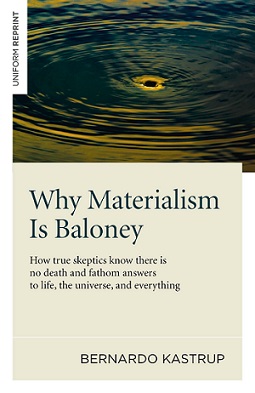
E. Given Dr. Kastrup’s credentials, he’s probably the leading spokesman in the world today in terms of explaining the fraudulent doctrine of the primacy of matter.
K. He’s very hard to argue against. His erudition and sharp angle on logic reminds me of this:
Sir Arthur Quiller-Couch (1863-1944), On The Art Of Reading: "A very well-informed person is an object of terror."
K. An "object of terror" because, in the presence of a person of knowledge, one can no longer hide in superstition, fake-news, and illusion.
E. This quote makes me smile, and readers will want to get Kastrup’s books for the full account, but for our purposes here let’s focus on his brilliant analogy of the two whirlpools:

K. Each human being corresponds to a different whirlpool; each person with his or her particular points of view and field of personal consciousness.
E. But here's where the fun begins. The whirlpools are not exactly stand-alone entities. These "bodies" are not substantive at all but only apparently so. And they might seem to exist "separately" in a vast ocean but, in reality, are connected, as each merely expresses, in a unique way, the underlying medium which is the ocean.
K. Each whirlpool is made of the same water, comes from the same source; so it is with apparently individual human minds.
E. Kastrup points out that these whirlpools-as-people are neither truly separate nor substantive but are "just undulations - disturbances - of the medium," be it the ocean or Universal Mind.
K. His thought-provoking definition of reality is a collection of "excitations" of Universal Consciousness.
E. This "parable of the two whirlpools" helps us visualize the meaning of "brains exist within consciousness" rather than "consciousness existing within brains."
|
postscript
These concepts of “the rest of God”, “subject and object,” and “no you and no me” are among the most difficult to understand in the lexicon of true love.
We’re used to thinking in terms of lover and beloved, of bonds of affection between stand-alone entities, of “I need love in my life and I must make you mine.” Well, all this still makes for fairly good law, but only on a certain level. The problem is, this kind of love, even between Twin Souls, is not enough to traverse the “terror of living forever.”
Coming to mind this moment is Dr. William Barclay's discourse on the New Testament Greek word for "eternal." It doesn't mean "endless duration" but "quality of life"; in context, the meaning suggests that if we are to properly negotiate eternal life we must, essentially, learn to "live as the gods." Doing things the way we always did them in New Jersey during our mortal time is not going to cut it for us.
What we need is the kind, or quality, of relationship or affection that mirrors a higher-order consciousness enjoyed by Mother-Father God. The mind of God is untainted by ego in all respects. God knows no sense of separation, no “subject and object”, vis-à-vis all aspects of creation.
How do we know what the mind of God is like? Well, here’s one clue for us.
As we discussed in another writing, higher-level perceptions of beauty are accessed only with the disinterested mind. And since God made the creation filled with beauty, when it didn’t need to be that way, we can reasonably infer that God’s mind naturally focuses on all things beautiful. But here’s how this applies to what we need to know for the topic at hand: the apprehension of loftiest beauty via the disinterested mind cannot occur unless that mind has accessed beauty from the perspective of “no subject and no object”; in other words, higher-order beauty cannot be perceived unless one is totally one with it.
|
beauty is not in the thing
Jiddu Krishnamurti, September 24, 1967, London: “Like love, beauty is not the cultivation of thought. A thing of beauty is not beauty. Beauty is not in the thing, in the building, in the person; but there is that beauty which is not the result of conditioning, in which thought in no way interferes.”
The sense of beauty is an opinion, a judgment, concerning the good and the true.
Beauty issues not from one's “hardware” but “software,” the “programming.”

See more discussion in the “waves” article.

K. I just realized something. Almost every John-and-Mary couple offer testimony that “the fever” of bodily allure is very temporary.
E. “…ever since the fire went out.”
K. But – “beauty is not in the thing.” One's sense of beauty is a judgment about the goodness of an object in question. When couples in the world declare that sex appeal quickly erodes, this just means that they no longer see each other as beautiful. The fantasy-balloon has been popped, and they now realize that “you are not the one to make me happy.”
E. Many of them, at this point of awareness, don’t even want sex from the other anymore; they don’t want to touch each other so much, and now they may opt for separate beds or separate rooms.
K. But, in the real love, it’s not that way.
|
This includes the transcendent beauty of your Twin mate; transcendent, meaning, you will perceive her in terms of "consonance with the whole." And this will cost us a few dollars more than just liking a pretty face.
As I write of these things, they seem foreign to me, as well, but then I abruptly recall that I have briefly mystically experienced the reality. And it must be experienced to make sense of it. We naturally gravitate toward traditional views of love, what we can see and touch, but the problem with this is that it contains an element of separation - and separation is the dysfunctional ego's weapon of choice, which is the cause of all unhappiness in the world. We are eternal beings with a date with destiny and the old ways of planet Earth will not take us to where we're required to go.
At this point, many might have doubts that what I say is true. However, humoring me and granting that it might be true, how shall we access this exotic realm of “the rest of God”, “no subject and object,” this “no you and no me”? We cannot employ will-power or simply choose to enter this domain, but the best we can do is to maintain an “open channel” and, at the right time, one’s own sacred soul will reveal long-concealed treasures.
|
Restatement:
What does it mean to discover your true mate by way of “no you and no me”?
These difficult concepts will remain unclear until “the heavens unfurl” as private revelation. Nevertheless, though mere words cannot properly convey, let us try one more time to explain the ineffable; at least, the rim of it.
We listen to the thousands of love songs and some of them speak to us on a deep level. We are well taken by phrases such as “angel baby,” “dream lover,” “I can hear music,” “love changes everything,” “truly, madly, deeply,” “crazy arms,” “my girl,” “who could ask for anything more,” “can’t help falling in love,” oh, what a night,” “this magic moment,” “earth angel,” “I will always love you” – we could go on.
I love all of these, it's hard to pick a favorite song, but - "this magic moment" by Jay and The Americans is really something: "so different and so new, unlike any other, until I met you, and then it happened, it took me by surprise, I knew that you felt it too, by the look in your eyes."
However - ask anyone and they’ll tell you of their favorite all-time love songs, and, back in the day, when they were first in love, they associated these sweetest romantic phrases, set to music, with a certain special one, the object of their affections.
Almost everyone started this way, thrilled to certain love songs, these magical phrases; and almost everyone believed that they would be the exception, they would be one to find true love, though the older crowd was already denying it.
And yet, fast forward, even just a little in life, and we find that it wasn’t enough. These sweetest romantic concepts, and all of the resultant affirmations of belief in love, did not take us to a desired destination of “living happily ever after.”
And the question becomes: How could we have felt all that we did, all of that headiness, that sense of swooning and staggering, the brimming-to-the-top feelings of intoxicated love, how could we have been taken captive by love’s “promised land” of all desires satisfied, but then, somewhere along the way, to have lost, or failed to gain, what we thought was in the offing? How is that possible? And, not just for one, or a few, but, essentially, the whole world.
Obviously, there’s something wrong, either with the system, or with us, or probably both.
In Omega’s “preface” I presented the research of Dr. Elizabeth Vandiver, a classical mythologist. Professor Vandiver explains that Aphrodite – or Venus to the Romans – is commonly viewed today as the “goddess of love.” But this is not correct, she said. The ancient Greeks would have worshiped her as “goddess of sexual passion”; or, more accurately, goddess of sexual insanity.
Vandiver said that if we were to ask an ancient Greek, “Do you believe in Aphrodite?” they would say, “Of course I believe in Aphrodite.” But, the professor clarified, what the speaker would have meant is, “Of course I believe in the madness of sexual passion. We see it everywhere. Everyone goes crazy when they’re in love and can’t think straight.”
The ancient Greeks, Vandiver asserts, would have considered sexual passion as a form of temporary imbalance of mind, which bio-attraction might flee from one as quickly as it came. To build a life, a settled married life, of children, business, wealth accumulation, and family legacy on the broken reed of sexual passion, sexual madness, was, to the Greeks, the height of folly. They weren't all wrong.
But let’s reconsider our question. How can one feel, all that one feels, so “truly, madly, deeply,” to have all that sweetness, proclaimed in thousands of love songs, to have experienced "this magic moment" feeling so real and so insistent, but then to have it fall so flat, about as quickly as it came. What is wrong with us?
Well, from one perspective, there’s nothing wrong with us. We're fine. What we feel, in principle, is not so different from what all mammals feel, what all “beasts of the field” experience, when Mother Nature comes calling and decides it’s time to perpetuate the species. This is a program that’s worked well enough over the millennia to “bear fruit and replenish the earth.” Dr. Niko Tinbergen won a Nobel Prize talking about this (see more on the “love” page).
Our problem with love is that we cannot approach it as do our feathered and furred brethren. It’s all in a day's work for them, just doing their duty, but we have this other situation going on called being “made in the image” that insists we are to move higher and become more. Until we agree, agree with ourselves, to fully enter this program we will discover ourselves to be on the wrong side of destiny.
All this is rather more than "I met a new boy last night in the neighborhood, something tells me I'm into something good." She might very well be into something good, but more will be required of her before there's capital appreciation on what she believes to be a good long-term investment.
Our task is to “learn to live as the gods.” This will include a few incidentals such as accessing an elevated level of consciousness allowing for "no you and no me". As Kairissi would say, "oh, that little thing."

E. I just understood something more clearly.
K. It’s always exciting to receive a “spark” of insight.
E. About 15 years ago, when I was first learning of the “true self,” one of the great teachers in this area -- I won’t mention his name right now – said something that I now perceive to be incorrect.
K. It’s wonderful, isn’t it, Elenchus – as we walk this path of enlightenment, it’s quite possible to overtake the understanding of original teachers. God has no favorite kids, and anyone can learn and zoom ahead, if they want to.
E. He was talking about how we can come to know God’s energy in all of creation – in a tree, a cloud, and of course, persons. And then he said, but there will be one special person who will reflect your love more perfectly than others. This seemed very reasonable to me, but as I was walking in the woods today, and as I viewed trees and clouds, and then thought of you, I suddenly realized that what he said years ago is not correct.
K. I think we’d all like to know this finely nuanced distinction.
E. As we’ve come to see, love retains the element of “subject and object,” “lover and beloved.” The intervening “distance” is room for the ego to make mischief of planting doubt and dissatisfaction, fear of loss and worries about measuring up. And so, as we now understand, love is not the highest virtue but must give way to sacred oneness, the state of consciousness of “no you and no me.”
K. Spell this out for us in terms of that “one special person.”
E. We can experience “no you and no me” with the physical creation. This is somewhat common when we stand in awe of the midnight sky – we meld with it. And we can do this, too. with a tree, a cloud, or a pet. But in these examples of no “subject and object”, the melding, shall we say, is not top-shelf.
K. That ultimate sense of oneness would be reserved just for your one-and-only.
E. Of course. And so I would modify the old dictum of “one who will reflect your love more perfectly than others” and make it “there is one special person with whom your spirit will blend most perfectly, in a manner and to a degree not possible with any other element of creation.”
K. No you and no me! – like what happened to us?
E. We're just gone in the “union of spirits” of “The Wedding Song.” We became “something never seen before” – the sacred One Person.
|

E. Those “sweet song phrases” prompt me to say a word more. It’s hard to let this subject go.
K. It’s ok, you have the microphone.
E. Well, I need to talk this out. What I’m getting is a contrast between the “sweet phrases” and how I felt when we “first met.”
K. Was it “this magic moment”?
E. That’s the funny thing. It was beyond that. I don’t want to start repeating myself as I’ve said similar things earlier; it’s just that, the intoxicated feelings of “this magic moment” and all that the song portrays, is just about the ultimate height of romantic dizziness. Music like that, sweet phrases like that – it just doesn’t get much better in any love song in terms of describing an ultra-attraction to a prized girl.
K. (silence)
E. But then, as I take a step back, I realize that it's not so unique as lovers, almost commonly, do feel all this, in the grips of their own “magic moment” – but…
K. … but, it’s not enough, is it.
E. Which truly feels like madness. As discussed in the restatement, how can we feel all that, way to the overflowing top of sexual passion, but then to have it all evaporate, like August dew, before mid-morning.
K. Elenchus, we have talked about these things for many years now, but it’s clearer than before that Mother Nature’s spell is far more devastating that we’d given her credit for. It’s more than just “chemicals in the brain” inciting desire for sexual union, but it’s mental, as well – we might even say, faux spiritual – it can trick us into thinking “I’m into something good” and God surely wants this for me because I feel it so intensely; but, in almost all cases, it’s just an illusion.
E. These “sweet phrases,” and all of the fervent sentiment embedded within the world’s best love songs – all this, of course, I would associate with you. I say this now, but, when we “first met” this was not on my mind. And though I experienced, without touching you, “the most erotic moments of my life”, I did so without the feelings made famous in songs like “this magic moment.”
K. This will be confusing to many; it could be confusing to me, if I didn’t know more. But please explain this, Elenchus.
E. Our brief “first meeting,” it’s really very instructive to me now, after the fact, as I mentally compare the intoxicated feelings engendered by a song like “this magic moment” and the sense of “no me and no you.”
K. We’re hoping you can make this difference clear.
E. I don’t think I can with mere words. But – from the present vantage point I “see” that the romantic pleasures of “no me and no you”, and its transcendent oneness, supersedes all of the sweetest passion of “this magic moment”; that is, the heightened, albeit somewhat common, romantic feelings of John and Mary.
K. During the time of “this magic moment” we are aware of the individuality of “lover and beloved.” But, not so with “no you and no me.”
E. In other words, there’s no ego involved, and therefore no sense of separation.
K. To state again, this is the heart of the problem. Because even during the intoxication of “this magic moment” it’s also quite possible to be bothered by one’s fears of losing the beloved: “will he like me enough, will he call me again, will tonight be our only time together,” and other fears.
E. And this is the real difference. In the “no you and no me” oneness, there is not an atom of fear of loss.
K. Because you can lose something that you have, but you can’t lose something, or someone, you “are”. And that's what it feels like during "no you and no me", but it doesn't feel like that during "this magic moment", despite the sweetest of it.
attempting to define life and consciousness
|
K. Elenchus, it occurs to me that the reason we see things more clearly when we enter the state of “no you and no me” is because, as we’ve said, what we are as “persons” is not a stand-alone entity before God.
E. This can be confusing because the Little Me Ego constantly preaches separateness.
K. It has its own agenda. But in reality we’re extensions of God, each of us a subdivision of Universal Consciousness, and not separate at all.
E. As Dr. Kastrup said, we’re like whirlpools in the same pond.

K. And so there really is “no you and no me” but only an illusion of separateness. No wonder we see more clearly when we mystically enter “no you and no me.”
E. It’s funny, the very word “individual” means “undivided”.
K. That is strange because we use that word to indicate “separate,” which is the very opposite of its literal meaning.
E. And the word “person,” too, means “mask”; again, the separateness is just a mask we wear.
K. Another false reading.
E. And so, what would you say, Kriss – what are we exactly?
K. Well, we have this sense of a thing called “I”, or a perception of self-awareness.
E. The term “ego” itself means “I” and imparts a feeling of self.
K. And "self" is accurate, but only to an extent. We are separate, but not as stand-alone entities, we're like “wholly owned subsidiaries of a parent corporation.”
E. I like that.
K. We say that we have “consciousness,” we say that we have “life.” But we have nothing of and by ourselves, for what we have derives from a central Source.
E. From a larger perspective, it’s more accurate to say that we, not have but, “are” consciousness and life; because, beside these, there is no “me”.
K. We’re falling deeper down the rabbit-hole here, but when we say that we have self-awareness, a sense of “I,” this would mean, I take it, that the essence of Universal Consciousness is a perception that “I exist.”
E. Kriss, it’s noteworthy that one of the famous names of God in the Bible is “I am that I am," the self-existent one.
K. The original writer or shaman of that document channeled this information from higher sources. It's one of the accurate things in the Bible. And so we, as derivatives of God, experiencing a sense of “I am,” are in fact affirming that we're part of Universal Consciousness; in other words, we share this sense of "I exist."
E. And how would you define “life”?
K. Fundamentally, what we call “life” is not a product of chemicals interacting – these merely sustain and perpetuate, but cannot originate.
E. They are editors not authors.
K. Yes, very good, editors not authors. And so it seems that “life”, necessarily so, is inherent within, or naturally flows from, our perception of "I exist" -- which signifies our link to Universal Consciousness. Life and "I exist" are indissolubly united, with no division possible.
E. You can’t have self-awareness without life. Can we have life without consciousness?
K. Many would say that consciousness resides only with higher-order entities. But maybe this isn’t totally true as even a stone, filled with the "life" of quantum activity, “knows” its place in the cosmic order. (See more discussion in "The Wedding Song".) But I think Dr. Sheldrake was onto something when he said that “consciousness is a quantum field of possibility.”
E. We confuse the definition of “life” with things like heart-beats and blood flow, but there are entities in worlds beyond ours, more alive than we, who don’t necessarily have heart-beats.
K. Mortals are prejudiced in favor of bodily definitions. But as we look at the issue more closely, the heart-beats and blood-flow are just a transient feature for lower-level creatures. The real essence of life has to do with Sheldrake’s “quantum field of possibility.”
E. What would you say this means for us still weighed down with the mortal body?
K. I think it means that each of us is a vast field of “no upper limit”, unbounded potential for growth – growth toward emulating Source.
|
K. Elenchus, I’d like to offer a restatement. Some of these truths are so wonderful that they can’t be mentioned too often: “no you and no me” is such a powerful concept. It speaks to an intimacy even greater than love itself!
E. And though we’ve talked about these things, it’s still jarring to hear it said out loud one more time.
K. The ancient metaphor of lovers becoming “One Person” is really a way of saying “no you and no me.” If you’re “one person” with your lover, there’s no intervening “distance,” no room for the ego to inject its terror of separation.
E. Keep going, Kriss.
K. “No you and no me” along with “One Person” are just synonyms for the Guides’ inspired phrase, “soulmate myself.” There’s no “distance” to plague lovers if your soulmate is also yourself, if you're that close.
E. About 30 years ago now when the author had that “message” in the middle of the night, “soulmate myself,” as I think he’s intimated, didn't sound like much; maybe a slightly catchy phrase but not earth-shaking wisdom. Little did we know then that the Guides were transmitting an alternate rendering, possibly, of the greatest aphorism concerning eternal love, the “One Person” status of the Genesis account, to be echoed by “no you and no me.”
|
materialists preach a gospel of 'many pretty fish in the sea', but how do we know they're not right
In the world, we hear banter like, “that girl you liked is now with someone else – ‘she's the fish that got away’ – but don’t worry, there are many pretty fish in the sea.”

Well, it’s true, there are many pretty fish in the sea – but is this the correct way of searching for true love? Why shouldn't it be along the lines, as the Beatles sang, “I need somebody to love, could it be anybody?” Why couldn't it be any nice girl with a pretty face?
But the world's success record here is not comforting. On these pages we submit that such philosophy becomes formula, at best, for lackluster marriage and, at worst, what Ann Landers called “the miserably married.” In fact, some of the prettiest faces in Hollywood suffer the most with marriage break-ups.
But if the precept of “many pretty fish in the sea” does not reflect highest reality, how do we know this to be the case?
In support of “one particular girl for one particular boy” is the confirming testimony of a great many teachers on the other side, and in this world. See “The Wedding Song” Prologue page.
And while this is valuable attestation, in the final analysis, words from others will not substantially convince, even if we want to believe. We need more. What is that “more”?
This page is one of a cluster of articles which speak to a concealed, non-material, aspect of romantic love: the topics under review include the esoteric labels of “no you and no me,” “existential beauty,” “touching foreheads in the Dazzling Darkness,” “the rest of God,” “consonance with the whole,” the mystical experience – all these, from various angles, address the issue of “one particular girl for one particular boy”.
However, once again, mere words, writings filled with them, cannot assuage the doubts of the deeper person. But here’s what will.
Finding the true mate is more a function of first finding oneself, the “true self.” And when we do, as we sharpen the focus of the “internal radar,” at the right time, when she crosses one's “hidden guidance field,” the inner soul energies, possibly, long dormant, will suddenly rise from the ancient depths, even against one's will, launching skyward, like missiles on target - and then we'll no longer need to ask the question, “How can I find my true love among an ocean of pretty fish?”

It will be more than obvious. You may forget your name and where you live, but you will not be confused concerning the veracity of “one particular girl for one particular boy”. And a million years from now, along with each intervening day, you will still recall, and thrill to, that first moment when you “came alive” - to her.
|
|
‘no distance,’ ‘no you and no me’, and the future of erotic love in Summerland

K. Elenchus, I’d like to offer another brief summary statement – primarily on the concept of “distance” – but also extend this somewhat.
E. I think “distance” is an extremely important idea and we’ve hardly begun to mine the riches with it.
K. It’s really a mystical experience (ME) and so, for lovers, we can’t just go and access it, like a couple deciding to make love. Eliminating “distance” creates “no you and no me” and, therefore, results in an eroticism far superseding physical love-making, but it can’t be accessed just by two going to bed.
E. You and I virtually stumbled into this ME -- totally by accident, weren’t looking for it -- and since that time we’ve thought a lot about it, and we’ve wondered how it can be regenerated.
K. What I’m seeing is that the ME of “no distance” is the future of erotic love for advanced beings. Now, we were not advanced beings when we first had this, but somehow we were granted the experience – I don’t know why -- maybe so that we could talk about it here and introduce the concept. But, once one has had this, you’re never the same again; and I don't mean it's like the first time two have sex; it's way far above that.
E. I’ll share something. You and I have talked about getting married in Summerland, having our “first chance” to be together as it all fell apart for us so quickly when we were teenagers. We won’t speak to that again right now, but, my point is, we’ve talked about what we’d like to experience during a honeymoon. But as I imagine the thrill and joy of having that, sometimes, to my surprise, I find myself feeling down, and I’ve wondered why. But then it finally came to me, what the real problem is in these imaginings. It has something to do with “distance.”
K. I think I understand. When we imagine a future wedding night, even if it’s in Summerland, we automatically gravitate toward traditional concepts of physical love.
E. And that’s the difficulty here – even if two are Twins -- because physical love can't get rid of the “distance.”
K. This is such an important concept. We’re not saying that a traditional honeymoon and wedding night would be a problem, it’s just that, it wouldn’t help us to feel love and joy all the way “to the top” of what we yearn to feel.
E. It’s pretty incredible. Two can be Twin Souls, but if they approach their marital love on a common physical basis, they’re going to run into the same problem of feeling “empty” pretty soon, just as any John and Mary off the street, because nothing physical can satisfy spiritual beings.
K. This is so important to understand. What we need – and maybe we'll have to wait to get advice on this in Summerland but – what we need is to learn how to access that first ME that started our whole “opening of the eyes”. We don’t know how to do that on demand, but I’m betting that there are advanced Guides over there who do know how to do this, and so we’ll have to investigate.
E. The benefit we have is that we know that this exists. We’ve experienced it, and so we know that it can be brought up from the depths by some process of “going within.” But we can’t say too much more right now.
K. This entire area of “no distance,” “no you and no me,” “no subject and object” is a vast field of future study.
E. And it's the basis for extreme feelings of erotic love – even without bodies in contact; in fact, as we learned, it has nothing to do with a "union of bodies."
K. Well, we know, this makes no sense to the average John and Mary out there, and we can’t “bottle and sell this” quite yet, not even for ourselves, but we do know -- because we've been there -- that this is the future of erotic love for advanced spirit-beings.

K. What I have to say is a natural outgrowth of our conclusions concerning “distance.” Even so, there’s a troubling element to it, and John and Mary will not enjoy hearing it.
E. (silence)
K. We said, that is, we came to realize, that nothing physical can ultimately satisfy a spiritual being. We said that an emphasis on an outward beauty could manifest as a sense of “emptiness,” even very early in the marriage, and might inflict its existential revenge during the honeymoon. But here is the inferential corollary that many cannot accept, at least, until mired in marital misery:
The more one focuses on outward beauty and the purely animal pleasures -- if that's all you have -- the faster a sense of well-being will flee from us. The more one runs after the “perfect measurements” of body parts, sexual image, and mere bio-chemical stimulation, the more psychologically isolated and dysfunctional, the more out of touch and disoriented one becomes; not just from the essential personhood of one’s bed partner, which is a dehumanizing filter of vision, but a separation from and loss of one’s own true self and soul.
K. There is a reason why Spirit Guide Margaret said that couples merchandizing each other in this way, treating each other as means to some other end, mere objects of pleasure, send more people to the Dark Realms than any other single factor.
|
|

E. I’d like our readers to know that my additional comments here are being offered a year or more after the completion of this writing.
K. As we’ve said, no writing is ever truly complete as we’re always seeing more.
E. What I have to say has to do with “most erotic moments” and “no you and no me.”
K. And how do these go together?
E. We encountered these when “we first met.” Suddenly we were plunged into a mystical experience (ME).
K. And just because one has a ME doesn’t mean one will understand its significance right away.
E. Ours was decades ago now, but I’m just starting to understand certain aspects of it. Recently I was jarred into a realization of contrasts. In ordinary physical love-making, Mother Nature is doing her duty to encourage a perpetuation of the species. And I hadn’t perceived this before but, during the very moments of sexual release, the mind goes offline, is overloaded with sensation, and there’s no thought during that time of frenzy. And it occurred to me, yes, of course, it would be that way because Mother Nature is not interested in promoting meaning, purpose, or rational thought.
K. She has a job to do and that’s all she’s concerned about.
E. She doesn’t want a couple to think too much.
K. Elenchus, this is very interesting, but, if I could add, the entire build-up to sexual consummation is a process fraught with illusion, often, irrationality. It’s a time when, according to popular wisdom, “love is blind,” “love has rose-colored glasses,” and the like. So, wouldn't it be true that the entire courtship of John and Mary so often becomes a study in skewed thinking? – with the whole process climaxing in the final act of sexual pleasure, with the brain “short-circuiting”, unable to think at all.
E. I would say that your observation is correct. And some of this we’ve alluded to before, but what I hadn’t seen is that, in the romantic ME, those “most erotic moments”, the authentic encounter of “no you and no me,” it’s all quite the opposite.
K. This makes sense because now Mother Nature is not running the show, Madam Destiny is.
E. And Madam Destiny is very interested in evolving us in terms of higher levels of consciousness.
K. I hadn’t seen this before, but you’re right. In the spiritual version of “most erotic moments” and “no you and no me” the mind does not go offline. In fact, one will have never been more coherent. Suddenly one perceives the identity of one’s Twin and a measure of destiny is revealed.
E. And this is why the mystic Omraam Mikhael Aivanhov stated that Twin Souls find freedom from illusion and the full experience of reality.
K. This is the exact opposite of what John and Mary experience. And now I’m finally understanding an insight from Will Durant. He commented on Father Bruno’s life and martyrdom, saying that there’s some subtle connection between growing sexual awareness and personal consciousness evolvement.
|
romantic love is often seen as something insubstantial, a whim, a fever, something to get over – but beware of violating the holy and authentic version of this
|
Life In Two Spheres, or Scenes in the Summerland, by Hudson Tuttle, channeled testimony from the other side. The speaker of the following is known as "the ancient Sage," a resident of Summerland for nearly 3000 years:
A newcomer to Summerland confesses that he had foolishly lost his true love when they were teens. He speaks to the Sage concerning how, during his Earth-life, he never recovered from his profound grief of losing her:
The Sage: "You are guilty?"
"Guilty! yes, a vile, guilty wretch! … I suffered so much, [but] recognized [the] punishment as just … [because] I loved a maiden, and she loved me. We played and sang together in our childhood, and in our youth our lot was always cast together. She was confiding, unaffected... She was always what she appeared.”
Editor’s note: The girl of his youth interacted authentically with him, wasn't trying to get anything but wanted only him; she confided, shared secrets of her life, spoke unaffectedly, never flirted or played a role, but “was always what she appeared.” However, the boy, not knowing his own mind well enough at the time, was led away by infatuations, a false “ideal,” a false ego-image.
“At length I saw [another girl, or girls, whom I foolishly believed to be] the ideal of my dreams. She made me forget my first love…” Very quickly, however, these mere passions of biology deserted him, so-called “love vanished, and I was miserable.” The girl of his youth, his true love, in her grief of losing him, made bad decisions for her life, and died prematurely.
“Oh, to think of this! To remember the pleasant days we passed together [in our youths] – that I, in whom she had placed her confidence, should cause her death, intensifies my suffering."
The Sage: "Human affection is more precious than diamonds; and he who crushes [it] is severely punished [in a natural way, by resultant suffering].”
"I was ignorant of the injury I was inflicting; I knew not [that] unanswered affections recoiled with such force. I supposed love [to be] but a transient passion, soon and easily subdued."
Editor's note: Imagine the emotional train-wreck for a young girl who had trusted, had emptied her secret heart to, a young boy, only to see him cavalierly wander away, and toss her away, in pursuit of some pretty face.
when the mountains are crushed to vapor, the holy and authentic romantic love will still exist
The Sage: "Cause and effect will eternally operate; and punishment must necessarily follow crime [against holy, destined romance]… [True] love is not [just] a passion, neither is it transitory, but it is the uniting of two souls into one; and unions founded on [this enduring] basis will exist, growing stronger and more intricate, [even] when [a] mountain shall have changed to vapor and passed away. This is [the] true marriage - an eternal union of soul, thought, and being. Passion is secondary, and will perish with the conditions on which it depends, but spiritual love is as lasting as time, and develops more and more in the Spirit-world. It seeks one object…
Editor’s note: The male, truly in love, “seeks one object” for his desire. Not just one woman in the sense of “any woman” to whom exclusive fealty might be offered, but “one particular woman.” See Dr. Campbell’s comments.
The Sage: “It seeks one object, and clings to it, through life and death, and puts forth its immortal bloom a thousand ages hence [that is, he will still feel the same though a thousand summers might pass]."

E. Let me put into common language what the Sage just said here: If a guy truly loves a girl, if his soul is invaded by her image, then he’s all done. He will never give her up. I mean, never. He will cross to the next life, but will never give her up. She might be immature, and not return his love, even in Summerland, for a while – but he will never give her up. If necessary, he will wait, bide his time, do what he can to help her mature, but – he will never give her up.
K. This is more than, “I like your pretty face, but there’re plenty more cute fish in the sea.”
E. It has nothing to do with being cute.
K. (softly) You know that I haven’t always treated you fairly… Will you wait for me in Summerland?
E. There’s no real choice to do otherwise. I will never give you up.
|
|
Life In Two Spheres, or Scenes in the Summerland, by Hudson Tuttle, channeled testimony from the other side. The speaker of the following is known as "the ancient Sage," a resident of Summerland for nearly 3000 years:
'for a reason', the perfect resume
A newcomer to Summerland, one who had been miserable in marriage on Earth, recounts to “the Sage” how he had chosen a mate “for a reason”:
"She loved me, or so pretended; and, when I was near, to all appearances, was an angel in goodness and love… She made herself the ideal I sought [in the "sweet deception"]. I loved that ideal, for it was the offspring of my childish dreams of my youthful heart...
“I will not say I loved her, but I did love the attributes I supposed she possessed - her apparent beauty, goodness, and gentle affectionate spirit. How fancy flew then! What would I not have done to gain her applause?”
Editor's note: See the article on "ego-images" for more discussion. The fellow's reference to loving an "ideal," to "apparent beauty," "fancy," and "attributes" well describes the beguiling images created by the ego.
The Sage: “You are only one in millions who have suffered in a similar manner. In fact, you have given a perfect description of earthly marriage, where each deceives the other into a belief that they are what they are not; and after union, the two unhappy beings find each other not the ones they loved, but strangers, who, by some [wizardry], have slipped into the places of the lovers."
The fellow is advised by the Sage to teach others of his painful lesson.
“What shall I teach?"
The Sage: "That marriage is more than the means of gratification of animal instincts; an eternal relation of two immortals, fraught with vast and far reaching consequences, which even death cannot annul, remaining strengthened and purified from every impulsive instinct."
"But how, O Sage, am I to teach such lofty doctrines? I shall be scoffed by those who would be reproved."
The Sage: "The truth is superior to all conventionalities. Go to some [psychic-medium] mortal and write [that your teaching might be channeled to the Earth]. Your thoughts may be ridiculed to-day, but to-morrow will be treasured, and future generations become your earthly monument."
|
|
Restatement II: The concept of psychological “distance” is extremely important but difficult to understand for those who’ve not experienced it. Whenever there is “subject and object,” including “lover and beloved,” then “distance” remains.
This is so even for those intensely absorbed in the intimacy of love. What does “distance” mean for those compellingly associated? It means that, in this “distance”, the ego has room to inject disturbing memories laden with doubt, hurt feelings, accusations of past untrustworthiness, and the like. One might be plagued with these dismaying images of one’s partner even in the midst of intense love.
Krishnamurti, May 28, 1961: "When you say, 'I love you' ... there is always this division between you and that which you love... So long as there is a division between the thinker and the thought, the experiencer and the thing experienced, the observer and the observed, there must be conflict. Division is contradiction."
These might be images of actual misdeeds of the past, or imagined ones, or the images might be of potential loss in the future, a fear of betrayal or "you have failed to make me happy". As long as there is “distance” then the ego will use this psychological sense of separation to create negativity.
Editor’s note: Examples of “distance” are too numerous to list; indeed, every example of love might fall prey to this systemic defect. However, to offer just one illustration, see the movie “A Man And A Woman” (1966); though she cared for him, she had great difficulty escaping the images of an earlier love.
And this is why love is not the highest virtue, but must surrender the crown to ultimate oneness, a state of “no you and no me,” wherein “distance” does not exist. In this most sublime state, lover and beloved "become each other."
One more view: the problem of love versus oneness
It is possible to love selectively. We say we love our children but might admit to loving other children less. And so it is with concepts such as patriotism: we love our own country but not other countries as much.
Love such as this is an extension of oneself, of self-interest. Some who are more high-minded will say that they love all children equally, and that they’re citizens of the world. But affirmations as these are made explicit for the very reason that it’s possible to think otherwise.
But none of this parochialism afflicts the domain of oneness. It is not possible to exclude or to favor some while living on the consciousness level of oneness. Oneness is universal, or it’s not oneness. But love does entertain the possibility of partiality.
|

|
Editor's note:
Adrian Smith commented on the above writing plus the "mystical experience" article:
"I relate to [these writings] on a very deep level. I have felt for a long time (and written about this in my book), that there is another way of knowing, independent of intellect, reason, or evidence, infinitely more reliable, yet completely illusive when trying to convey the experience to anyone else. Those who speak of it know it not. In this life we can never be completely certain of anything. Jurors are counseled to decide beyond a reasonable doubt but not beyond any doubt. Most knowledge arrives second hand and, as you point out, this is true of the psychic who is only a conduit. Paul preferred this mystic experience above the psychic gifts which were more attractive and glamorous to the uninitiated. The mystical experience by contrast conveys a level of certitude which is beyond any doubt, but this is entirely personal. Nevertheless, true mystics will encounter each other speaking the same language and coming from the same country though separated in space and time. It seems that our love of life is intimately bound up with gender and the experience of romantic attraction illustrates ecstatic union with the Divine. I was just reading about an ancient demon god that compelled its victims to change their gender. Perhaps we are witnessing a return of the old gods."
|
|
Editor's last word:
Strange to say, love, per se, is not the zenith of the levels of consciousness. It’s close, but there’s something else.
Love retains a sense of “subject and object”, lover and beloved, and therefore a duality is maintained, barring us from total oneness. What’s needed is what Krishnamurti called a “total field” of perception in which “subject and object” melt away. This is what Elenchus briefly glimpsed and entered during his initial mystical encounter with his Twin. See K's "valentine's day, 1969" lecture wherein he speaks of "total field."
See, too, Dr. Hawkins’ levels of consciousness. He gets it right. Love is near but not at the very top of the roster.
Everything that has a beginning is also subject to an ending.
But there exists a domain beyond the reach of time’s degradation. There, things simply exist, eternally, have always been, have no opposite, no duality, and do not suffer loss.
This "rest of God," this freedom from the tyranny of the ego, this overwhelming sense of the oneness of all things, represents an “Omega Point” maturity. It occurs in one timeless moment of cosmic clarity, not 100,000 lives as the pernicious doctrine of reincarnation preaches. See 100 short articles discussing the error and fraud of “R”.
Also see “the 500 tape-recorded messages from the other side” which reveals an entire class of millions over there who dearly, but unrequitedly, hope for “R” – because they have no concept of what Elenchus and Kairissi were given to know.
|
PART II
While all aspects of truth are related, the following articles are most germane to the subjects of the Dazzling Darkness, the Mystical Experience, and Existential Beauty:
Kairissi and Elenchus discuss how lovers' perceptions of existential beauty lead them to ultimate intimacy and oneness
Touching foreheads, entering a condition of "no you and no me," a quality of sacred silence, the Dazzling Darkness, with no space or separation, an Omega-Point intimacy
The Mystical Experience: 'silence your ego and your power will rise'
Part I, Existential Beauty: Noting a sunrise as messenger of a new day is not the same as discerning the dawn as dreamily enchanting. The sublime awareness allowing for such is untainted by utilitarian concern.
Part II, Existential Beauty: Consonance with the whole: “What is good is in consonance with creation as a whole and therefore also with the world of men. Whenever we see the Good and the True in perfect accord, the Beautiful stands revealed.”
We feel uplifted at the singing note of a bird, a blossoming rose, and with a woman’s grace and loveliness. But can any of these bring about a transformation of heart and mind? Is her mystical allure a basis for authentic love and marriage?
Plotinus, On Beauty: Why do we judge certain objects, sounds, ideas, or virtues to be beautiful? Is beauty symmetry and proportion, a charm of color, a display of light, or more than this? Is beauty in the thing itself or merely our estimation of it? Does beauty represent a translucence, a shining through, of a remoter principle? Plotinus, probably more than any other of history, attempted to explain the mystery of beauty.
Over the years on WG, we have referred to Twin Soul love as founded upon “soul energies.” However, as Tesla asserted, to know the universe, one must think in terms of “energy, frequency, and vibration.” As such we may be able to further clarify Twins’ affinity as oscillating waves of Consciousness.
plus some extra notes on the Dazzling Darkness in:
Aloneness 1-Minute Essay
|
